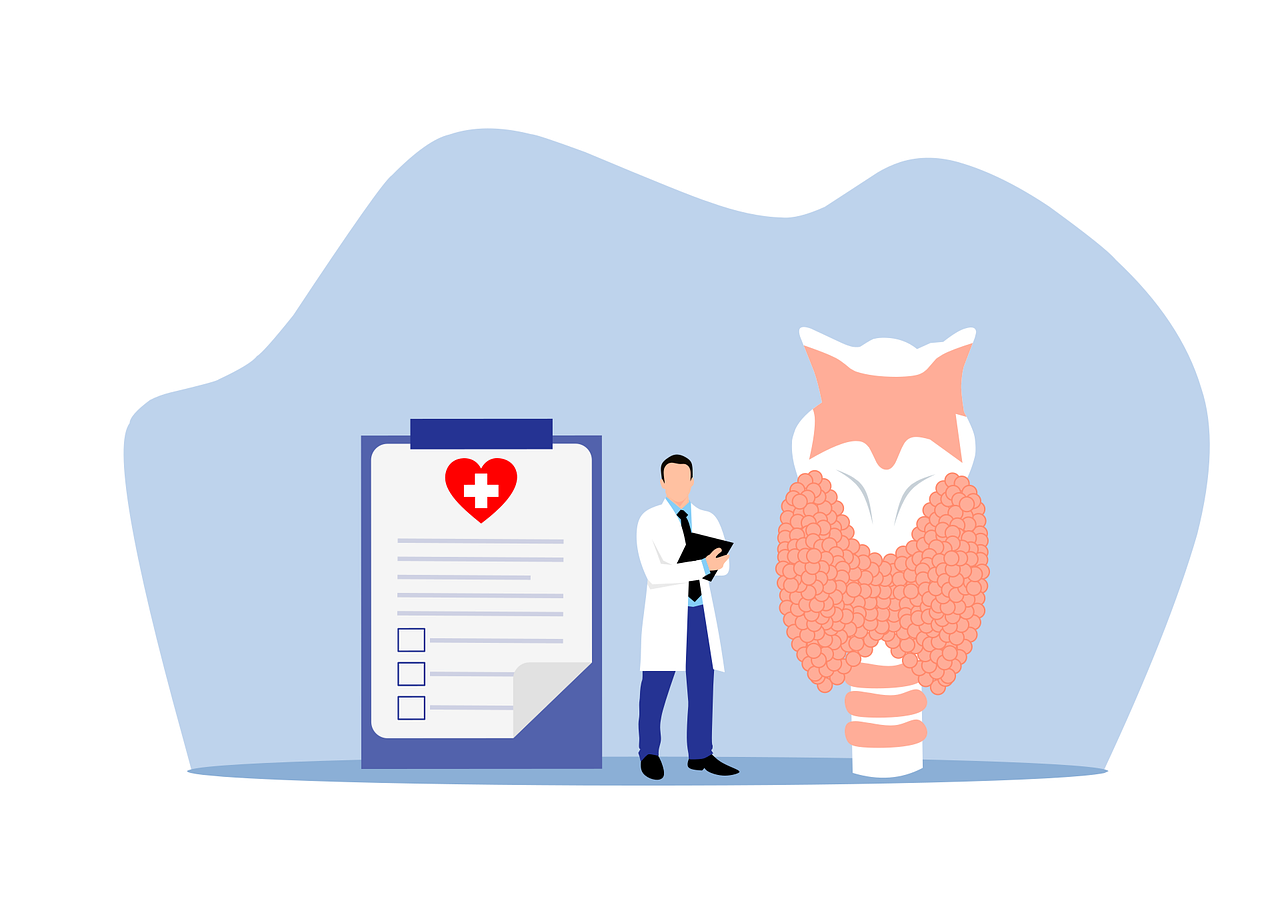All about thyroid health:
Maintaining thyroid health is crucial for overall wellbeing and proper body function. Let’s begin with definition of Thyroid gland. Maintaining thyroid health is crucial for our metabolic and hormonal health.
What is thyroid gland?
A small, butterfly- shaped the gland located at the front of your neck, under your skin. It is part of your endocrine system and controls many of your body’s important functions by producing and releasing certain hormones.

Functions of the thyroid gland; –
Thyroid is the epicenter of the body affects almost every organ of body, such as Regulates metabolism, growth and development of body, control heart muscle and digestive function, promote brain development and bone maintenance, regulates body temperature, heart rate and blood pressure. In addition, its correct functioning depends on a good supply of iodine from the diet and Thyroid cells are the only cells designed to absorb iodine to make hormones. Additionally, if thyroid dysfunction happens, it affects weight, hair, skin, mood, and hormones.
To know more on liver and gall blader health, read this article, https://sparklinglifestyle.in/liver-and-gallbladder-health/
What are thyroid hormones?
- T4 (Thyroxine); – It is inactive form of thyroid hormone and most common form and it is produced by thyroid gland. T4 is found in the body in two forms, free T4 and bound T4. Free T4 is active form of thyroxine hormone that enters your tissues, where it is needed. On the other hand, bound T4 attaches to proteins that prevent it from entering these tissues, more than 99% of T4 is bound.
Testing T4; – A total T4 test measures free and bound T4 together. Similarly, a free T4 test directly measures the amount of free T4 in your blood. Medical experts believe this test provides more accurate information than a total T4 test. So, it is used more often.
- T3 (Triiodothyronine); – It is active form of thyroid hormone and produced by thyroid gland. Higher than normal T3 levels typically indicate hyperthyroidism, overactive thyroid. On the other side, low T3 levels may indicate hypothyroidism, a condition in which your body does not make enough thyroid hormone.
- TSH (Thyroid stimulating hormone); – TSH tells your Thyroid, how much thyroid hormone it needs to make. It also stimulates the thyroid gland to produce thyroxine and then triiodothyronine, which stimulates the metabolism of almost every tissue in the body. TSH is produced by pituitary gland, also known as thyrotropin. In addition, it maintains daily rhythm, so levels differ depending on time of day.
Remember, TSH levels run opposite to thyroid hormone levels. Too low thyroid hormone = large amount of TSH, and too high thyroid hormone = little or no TSH.
- Reverse T3; – It is metabolically inactive form of T3. High rT3 = Most of T4 is converted into reverse T3. High reverse T3 levels can be caused by almost any series of prolonged illnesses. For example, low blood oxygen levels, severe malnutrition (especially a lake of carbohydrates), severe diabetes, kidney, or liver disease, may be some common causes.
Common tests include – TSH, free T3, free T4, reverse T3. Total T4, total T3, free thyroxine index (which may be better estimate of hormone level and T3 uptake.
Common thyroid dysfunction; –
- Hypothyroidism.
- Hyperthyroidism.
- Subclinical hypothyroidism.
- Goiter.
- Hashimoto’s thyroiditis.
- Graves’ disease.
Hypothyroidism: – It is under active thyroid. In hypothyroidism, TSH will be high, and thyroid hormone will be low.
Possible causes of Hypothyroidism; –
- Hashimoto’s thyroiditis (autoimmune hypothyroidism).
- Inflammation of thyroid.
- Hypothyroidism treatment.
- Radiation therapy.
- Surgical removal of part or all of thyroid.
- Lack of iodine.
- Certain medications.
Symptoms of Hypothyroidism; –
- Feeling tired.
- Weight gain.
- Sensitivity to cold.
- Puffy face.
- Muscle weakness.
- Brain fog.
- Thin or straw like hair.
- Memory problems.
- Dry skin.
- Constipation.
- Irregular or heavy periods
Hyperthyroidism: – It is overactive thyroid. In hyperthyroidism, TSH will be low, and thyroid hormone will be high.
Possible causes of Hyperthyroidism; –
- Graves’ disease. (Autoimmune hyperthyroidism, it is a most common cause).
- Inflammation of thyroid.
- Some tumors of the testes or ovaries.
- Taking too much thyroid hormone.
Symptoms of Hyperthyroidism; –
- Anxiety.
- Difficulty in concentration.
- Weight loss.
- Hair loss.
- Rapid heart rate.
- Increased appetite.
- Bulging eyes.
- Fine, brittle hair.
- Sleep issues.
- Sensitivity to heat.
- Irregular menstruations and infertility.
- Tremors.
- Fatigue.
- Muscle weakness.
Subclinical Hypothyroidism: – It is often undiagnosed TSH will be high, and thyroid hormone is normal.
Possible causes of subclinical Hypothyroidism; –
- Poor gut health.
- Gluten intolerance.
- Toxin exposure.
- EMF exposure.
- Thyroid surgery of radiation in past.
- HPA- exists dysfunction.
- In addition, Variety of drugs like lithium, medicines of cancer or heart rhythm abnormalities.
Symptoms of subclinical Hypothyroidism; – same as Hypothyroidism.
Goiter: – Swelling or abnormal enlargement of thyroid and in Goiter, thyroid function is often normal. Moreover, it is more common in women.
Possible causes of Goiter; –
- Iodine deficiency- If you do not have enough iodine in your diet, the thyroid gets larger to try and capture all the iodine it can, so it can make the right amount of thyroid hormone.
- Similarly, Hashimoto’s thyroiditis and Graves’ disease.
- Additionally, Certain medicines such as lithium and amino Daron.
- Furthermore, some infections are also responsible for goiter.
Symptoms of Goiter; –
- Enlarged thyroid gland and it is main symptom.
- In addition, some people may have symptoms of under active thyroid gland.
- Moreover, in rare case patient can feel pressure on windpipe (trachea) and food tube (esophagus).
Remember, Women are five to 8 times more likely to have thyroid dysfunction than men.
Why women are at higher risk?
- First, Birth control pills.
- Similarly, Periods.
- Additionally, Pregnancy.
In above all three categories, hormonal roller coaster happens. That is why maybe thyroid gland dysfunctions occur.
Symptoms of thyroid dysfunction in men; –
- Low sex drive.
- In addition, Premature or Delayed ejaculation
Thyroid dysfunction can lead to,
- Pregnancy complications or infertility
- Miscarriage and Irregular periods
- Moreover, Postpartum thyroiditis.
Lifestyle modifications for thyroid health; –
Improving gut health..
- Eliminate certain foods; – For example, Avoid gluten, sugar, milk, ultra processed and packaged foods.
- Including Gut- supporting foods; – For example, Fermented foods/ probiotics like kimchi, sauerkraut, homemade curd, etc. Soluble fiber such as Apples, carrots, lentils, avocado, broccoli, and Insoluble fiber such as veggies and whole grains.
- Including thyroid- supporting foods; – For example, 2 Brazil nuts a day for selenium, cooked cruciferous vegetables, sea vegetables or seaweed for trash minerals and iodine, pumpkin and sunflower seeds for zinc, legumes and beans for fiber and micronutrients.
Detoxification for thyroid health
- Use organic and clean produce foods and stay away from pesticides or chemicals; – For example, use organic fruits and Veggies, grass- fed meat, wild- caught fish, free- range eggs and non- GMO products.
- Mindful usage of mobile phone; – For example, use speaker or earbuds while talking, keep phone away from body as much as possible while sleeping, keep phone in airplane mode, all gadgets out of bedroom while sleeping, turn off Wi-fi whenever not needed, and also avoid microwave usage.
- Extra support for detoxification; – For example, avoid X- ray if not necessary and plastic. Use BPA- free plastic for water bottles and for containers or best to use glass. In addition, avoid soy; isoflavones might interfere with thyroid peroxidase (TPO), which is essential for thyroid hormones and choose better quality water.
Balancing Estrogen Dominance for thyroid health
- First, avoid antibiotics because poor Gut causes estrogen to recirculate in the body.
- In addition, Limit alcohol because alcohol impairs liver’s ability to process estrogen.
- Moreover, vitamin- B complex supplements in your routine.
- Furthermore, explore non- hormonal birth control options.
- Similarly, eliminate soy and xenoestrogen, such as BPA.
Managing stress for thyroid health
- Build morning routine; – For example, incorporate meditation, pranayama, Prayer, walking barefoot on grass, yoga, or favorite activities in your routine.
- Build evening routine; – For example, incorporate gratitude diary, journaling, Epsom salt foot soak or warm shower, reading a book, Quality time with friends and family, or taking a walk in a routine.
Step 5; Introducing supplements
- For example, Vitamin D, selenium, magnesium, iron, zinc, vitamin- B complex and herbs like Ashwagandha. These supplements are very essential for thyroid health as well as overall wellness.
conclusion:
In conclusion, you must remember, if you suspect more symptoms with your thyroid, it is essential to consult a doctor or physician for proper evaluation for thyroid health and its management. To know more about overall wellness, read my latest book, the magical ways for sparkling lifestyle.



Leave a Comment